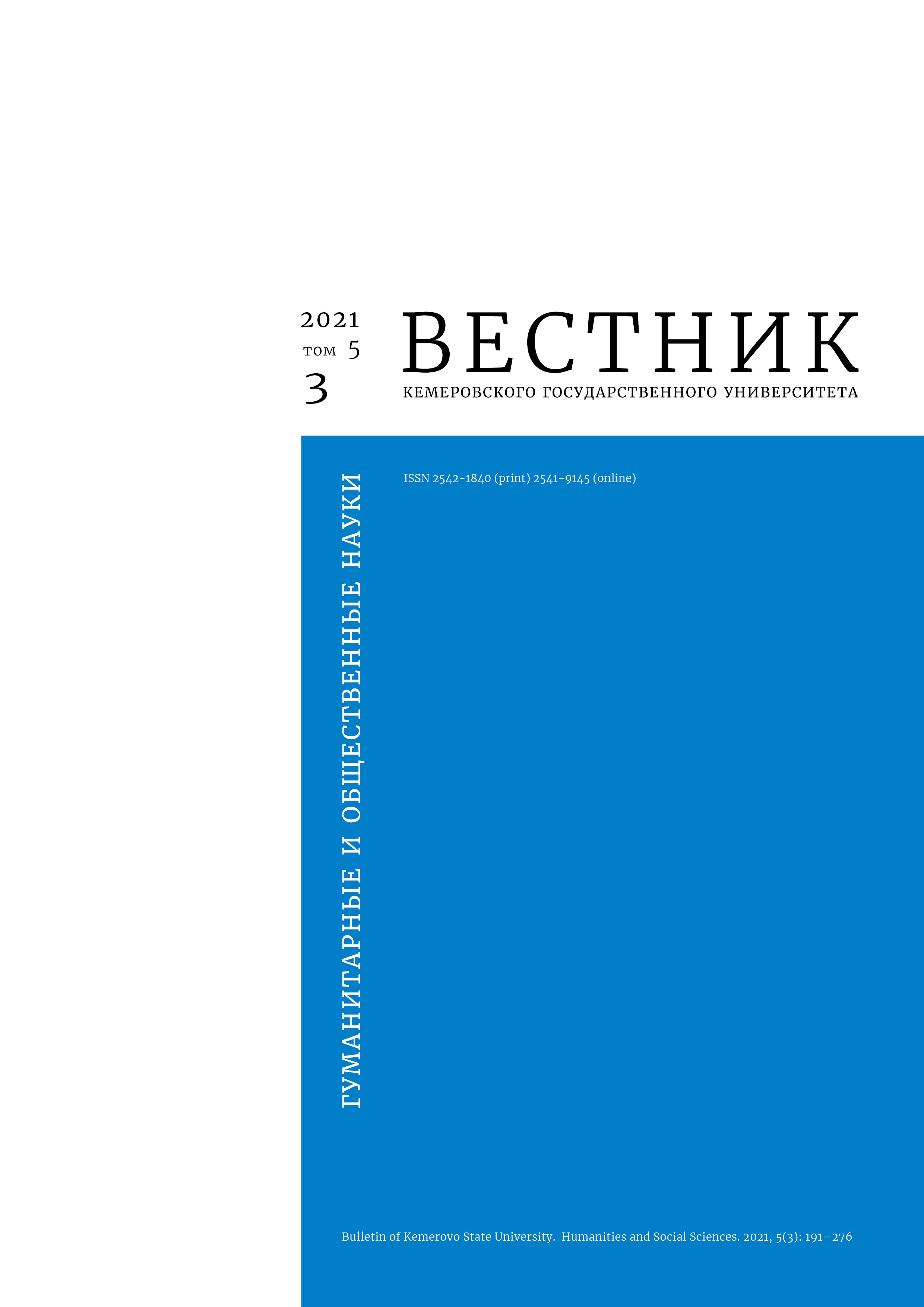Kemerovo, Russian Federation
The article introduces the phenomenon of pedagogical convergence. It appeared as a result of global changes that convergent technologies triggered in science, technology, economy, society, and culture. The research objective was to identify the basic principles and conditions for the formation and implementation of pedagogical convergence in domestic and foreign higher education. The authors analyzed domestic and foreign approach to convergence in pedagogical theory and practice, as well as developed an interdisciplinary methodology for studying this phenomenon. Pedagogical convergence outstrips the needs of society in training highly qualified specialists able to deal with technological convergence in all aspects of human activity. Therefore, higher education institutions need to teach their students to develop, borrow, and adapt convergent technologies. This study contributes to the development of pedagogical science in terms of theoretical comprehension of the phenomenon of pedagogical convergence. The new methodology can help to train university graduates who are familiar with the latest achievements of global science and are able to borrow new convergent technologies and adapt them for the needs of their professional activity.
higher education system, interdisciplinary approach, principles, conditions, professional activity, interpersonal interaction, teamwork
1. Portnova T. V. Issues of integration of science and art in the research of artistic culture of the Renaissance. Mir nauki, kultury, obrazovaniya, 2019, (4): 236-239. (In Russ.)
2. Stern W. Differential psychology and its methodological foundations. Moscow: Nauka, 1998, 335. (In Russ.)
3. Efremenko D. V., Giryaeva V. N., Evseeva Ya. V. NBIC-convergence as a problem of social-and-humanity knowledge. Epistemology & Philosophy of Science, 2012, 34(4): 112-129. (In Russ.)
4. Menyaeva M. P. Idea of cultural convergence of P. A. Sorokin in communicative aspects of XX-XXI centuries. Vestnik Cheliabinskoi gosudarstvennoi akademii kultury i iskusstv, 2005, (1): 59-64. (In Russ.)
5. Barro R. J., Sala-i-Martin X. Economic growth. Moscow: Binom. Lab. znanii, 2010, 824. (In Russ.)
6. Converging technologies for improving human performance: nanotechnology, biotechnology, information technology and cognitive science, eds. Roco C., Bainbridge W. N. Y.: Kluwer Academic Publishers, 2003, 482.
7. Roco M. C. Convergence science for societal solutions and education. Global Perspectives in Convergence Education, 2-3 Nov 2017. Washington DC, 2017.
8. Chernigovskaya T. V. A person in the digital world. The 12th Summit of Psychologists. St. Petersburg, 3 Jun 2018. Available at: https://psy.su/feed/6900/ (accessed 1 Aug 2021). (In Russ.)
9. Richey M. Convergence in professional education. Global Perspectives in Convergence Education, 2-3 Nov 2017. Washington DC, 2017.
10. Building America’s skilled technical workforce. Washington DC: The National Academies Press, 2017, 258. https://doi.org/10.17226/23472
11. Klein J. T., Falk-Krzesinski H. J. Interdisciplinary and collaborative work: Framing promotion and tenure practices and policies. Research Policy, 2017, 46(6): 1055-1061. http://dx.doi.org/10.1016/j.respol.2017.03.001
12. Nurius P., Kemp S. Individual-level competencies for team collaboration with cross-disciplinary researchers and stakeholders. Strategies for team science success, eds. Hall K., Vogel A., Croyle R. Springer, Cham., 2019, 171-187. http://dx.doi.org/10.1007/978-3-030-20992-6_13
13. Pervova G. M. Convergence of methods as tendency of modern pedagogics development. Sotsial'no-ekonomicheskiye yavleniya i protsessy, 2014, 9(6): 73-77. (In Russ.)
14. Novikov A. P. Convergence of educational bachelor’s programs in university education (the case of life safety and Geography Course, educational program Pedagogical Education at Transbaikal State University). Scholarly Notes of Transbaikal State University, 2017, 12(5): 20-26. (In Russ.) https://doi.org/10.21209/2542-0089-2017-12-5-20-26
15. Ismagilov R. M. About convergent education. Koncept, 2015, (T13): 351-355. (In Russ.)
16. Manako A. F., Voronkin A. S. Information technologies in education: evolution, convergence, and innovations. Obrazovatelnye tekhnologii i obshchestvo, 2014, 17(1): 487-521. (In Russ.)
17. Kapranov V. K., Kapranova M. N. Educational convergence. Standart, 2016, (3): 2-3. (In Russ.)
18. Svechkarev V. P. Convergent education based on cognitive technologies. Inzhenernyj vestnik Dona, 2015, (1-2). Available at: http://ivdon.ru/ru/magazine/archive/n1p2y2015/2887 (accessed 1 Aug 2021). (In Russ.)
19. Beshenkov S. A., Shutikova M. I., Mindzaeva E. V. From information to convergent technologies: education aspects. Prepodavatel XXI vek, 2016, (4-1): 86-93. (In Russ.)
20. Dudeney G., Hockley N, Pegrum M. Digital literacies: Research and resources in language teaching. Pearson Education Limited, 2013, 388.
21. Hockly N. Digital literacies. ELT Journal, 66(1): 108-112. https://doi.org/10.1093/elt/ccr077
22. Kurkin E. B. Convergent education for modern children. Educational Policy, 2011, (3): 45-52. (In Russ.)
23. Schweingruber H. Research-based insights for teaching convergence via Grand Challenges. Global Perspectives in Convergence Education, 2-3 Nov 2017. Washington DC, 2017.
24. Welch-Devine M., Shaw A., Coffield J., Heynen N. Facilitating interdisciplinary graduate education: barriers, solutions, and needed innovations. Change: The Magazine of Higher Learning, 2018, (50): 53-59. http://dx.doi.org/10.1080/00091383.2018.1510268
25. Korenevskiy A. V., Uznarodov I. M. Modernization of education: individualization and interdisciplinarity. Visshee obrazovanie v Rossii, 2010, (11): 113-118. (In Russ.)
26. Snopkova E. I. The topicality of an interdisciplinary approach in pedagogical research: scientific rationale. Integrastiya obrazovaniya, 2015, 19(1): 111-117. (In Russ.)
27. Osmolovskaya I. M., Krasnova L. A. The problem of interdisciplinary in learning process studies. Obrazovanie i nauka, 2017, 19(7): 9-24. (In Russ.) https://doi.org/10.17853/1994-5639-2017-7-9-24
28. Fiore S., Gabelica C., Wiltshire T., Stokols D. Training to be a (team) scientist. Strategies for team science success, eds. Hall K., Vogel A., Croyle R. Springer, Cham., 2019, 421-444. https://doi.org/10.1007/978-3-030-20992-6_33
29. Hall K. Science of team science: informing convergence education. Global Perspectives in Convergence Education, 2-3 Nov 2017. Washington DC, 2017.


















